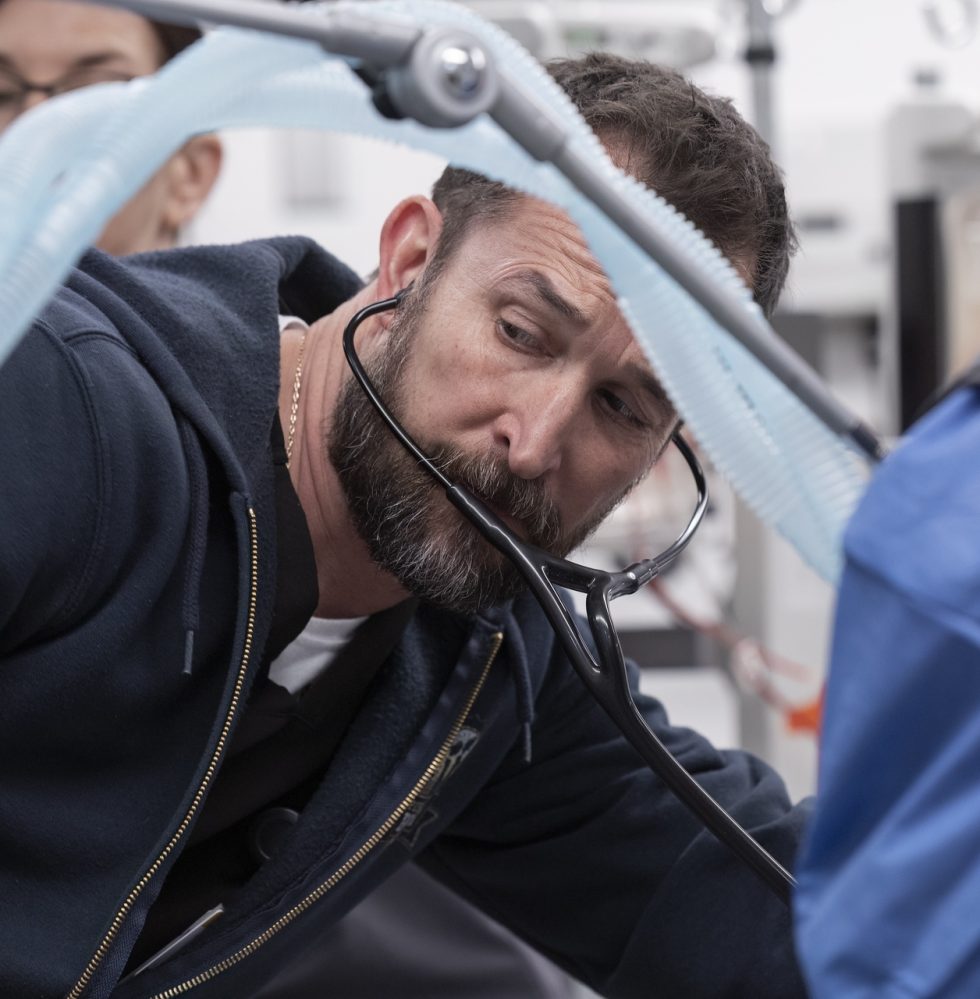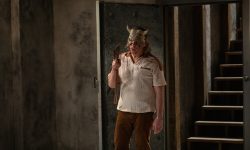
This was clearly not the reaction that Noah Wyle was expecting from his starring role on The Pitt. While appearing on a recent installment of The Jennifer Hudson Show, the eponymous host caught the actor off guard by blurting out, “I don’t want to get you blushing again, but the internet be crushing on you.” As Wyle’s face turned cherry red, Hudson began reading off social media comments like “thank you for setting unrealistic expectations about how hot my male doctors would be in my life” and “you got no business being that sexy.”
“Do you ever get used to that kind of attention?” asked Hudson.
While attempting to mask his rouged mug, Wyle could only laugh and shake his head.
Ever since Max began streaming the drama about life in a fictitious Pittsburgh emergency room, it’s been one pinch-me moment after another for Wyle and his fellow executive producers John Wells and R. Scott Gemmill. Before he began work on The Pitt, Wyle believed that his old series ER was the “best medical show that ever was” and that no one since then had been able to “bring more sense of tension and immediacy than what we created with some of those Steadicam shots” on the long-running NBC drama.

Wyle as Dr. Robby with his team
Warrick Page/Max
Many have tried, of course. Mad props to Shonda Rhimes and her Grey’s Anatomy, now the longest running primetime medical show after 21 seasons. But Meredith and her dead hubby Derek have been out of the zeitgeist for years, and no medical show has truly been able to recapture that magic — that is, until we first met Dr. Michael “Robby” Robinavitch last January on the anniversary of his mentor’s death.
Part of what makes The Pitt so appealing (it averaged 10 million viewers per episode in the first season) is the way in which it unspools the story of Robby and his band of ambitious interns. Each episode represents an hour in the staff’s frenetic, 15-hour day that culminates with a mass casualty shooting and an incomprehensible case of the measles involving an unvaccinated child. Adding to the intrigue is how the action never really leaves the confines of the ER, so extras that appeared in the beginning of the series can be seen in the background by the season finale.
“It was very financially advantageous to shoot this way, but it’s also the best way to tell the story,” Wells explains. “We live in these smaller worlds, in these smaller spaces. It’s a human-level show. It exists where we exist. We are going into spaces and meeting people who you meet all day long in your own life. Audiences love both. They want to go to places they’ve never been before. And they also want to be connected to what’s really in their day-to-day life.”
“When the sh*t hits the fan and you expect the white knight to come charging in on the horse, it would be very disconcerting to see the hero on the floor having a breakdown.”
Noah Wyle
And viewers have truly connected with Wyle’s Robby, however flawed the character may be. Though not unlike the intelligent and compassionate Dr. John Carter, the character Wyle played for 11 seasons on ER, Robby becomes increasingly prone to fits of rage, like accusing a patient’s mom of engaging in “Dr. Google Bullsh*t” before melting down and hiding away in a peds room. His mental instability is rooted in the death of his mentor during the pandemic — a life-altering moment first revealed in the drama’s pilot.
“When the sh*t hits the fan and you expect the white knight to come charging in on the horse, it would be very disconcerting to see the hero on the floor having a breakdown,” admits Wyle, whose character name was inspired by his own Russian, Ukrainian and Jewish family roots. “Suddenly the metaphor for the strength of our healthcare system is the strength of the individual practitioners in our healthcare system. Their health is our health and the degree to which they can have access to mental health resources is how we’ll determine the fabric of our safety net in this country and how well we care for each other. It’s really a fragile system, and if you read the papers, it just got a lot more fragile. I think we’re asking too much of them.”

Warrick Page/Max
At least he’s eager to continue giving them a voice. The Pitt, which is both a nickname for Robby’s ER and the city in which the show is based, has already been renewed for a second season. The next shift planned for 2026 will pick up on the 4th of July with new med students and a bevy of fresh cases. And with any luck, a few of the unanswered questions will be answered, like whether Patrick Ball’s Dr. Langdon deserves to keep his job as a senior resident after getting caught stealing drugs, and whether the mama bear charge nurse played by the excellent Katherine LaNasa will want to return to the job after she was clocked by an angry patient.

Read the digital edition of Deadline’s Emmy Preview magazine here.
In the meantime, the tidal wave of goodwill toward The Pitt (not to mention its chances of success at the upcoming Emmys) has managed to lift all boats: medical dramas are suddenly hot again, with Fox finding unexpected success with Doc, starring Molly Parker, and planning to launch a remake of the Doc Martin series in 2026 with The Good Wife’s Josh Charles. NBC continues to generate good ratings with Dick Wolf’s Chicago Med and ABC has already renewed Grey’s Anatomy for an astonishing 22nd season.
The fact that any new show like The Pitt can immediately resonate with fans — not to mention the medical world that appreciates the gritty realism — is a bit of a head-scratcher for the team behind the Warner Bros. drama. But they’re not taking any of it for granted.
“You make shows that you just hope will connect with people,” Wells says. “What’s been great is that this show connected so quickly. As an example, we made Shameless for Showtime, and it really didn’t become a hit until its fifth season because it just takes a long time with so many shows in the market. The thing that’s been really gratifying is that a lot of people found The Pitt quickly, and that to me is a miracle in the world we live in now.”


